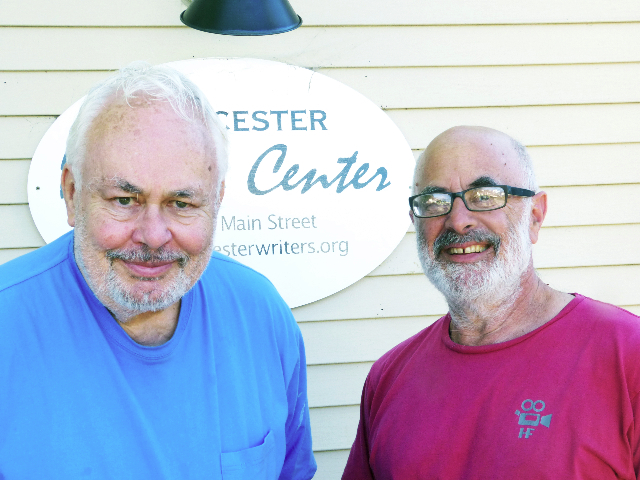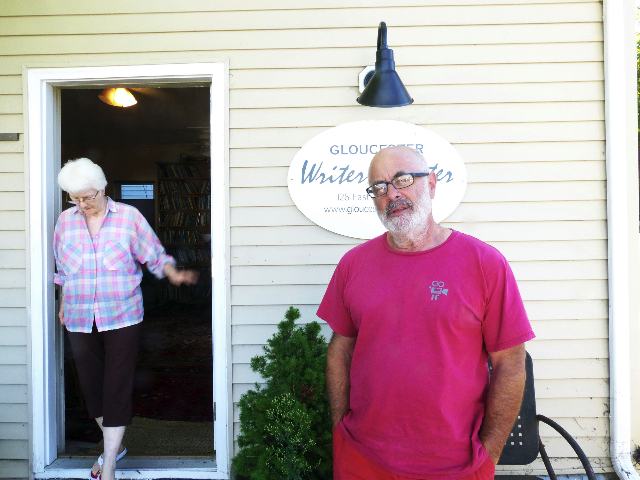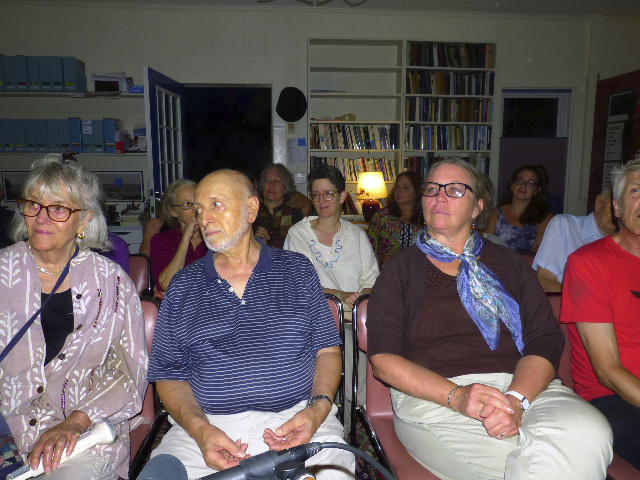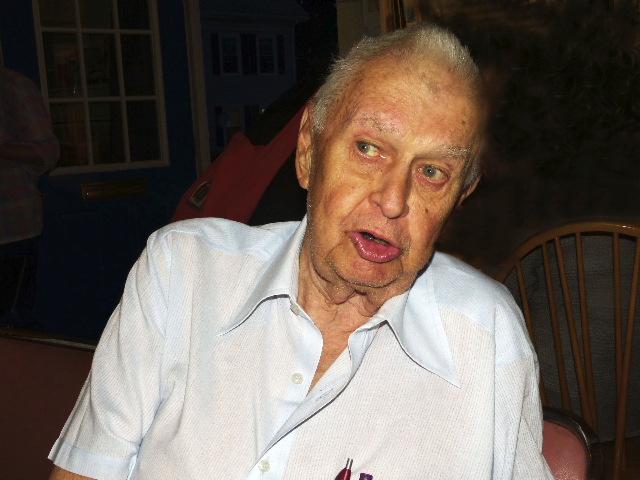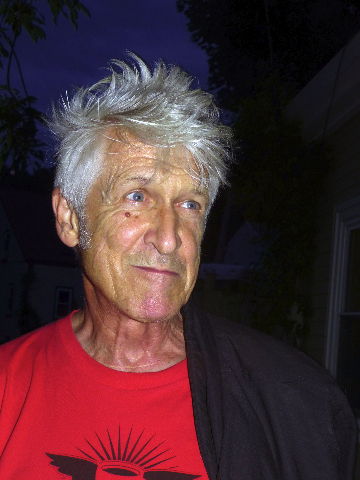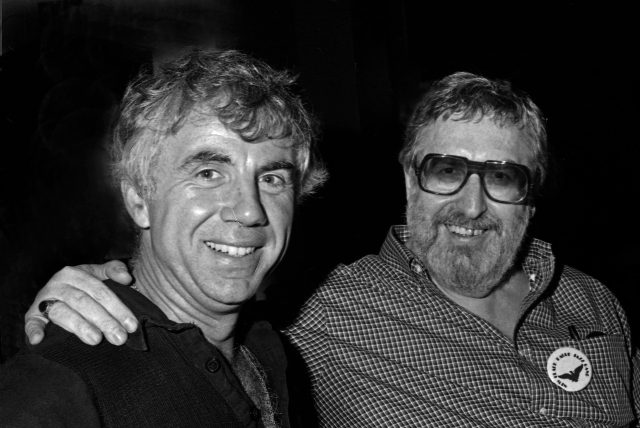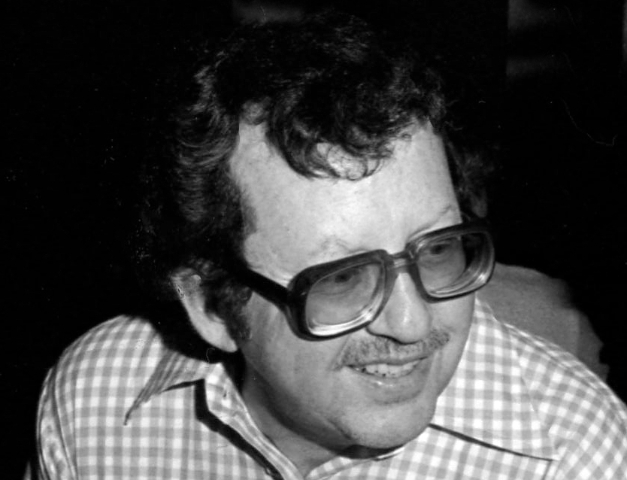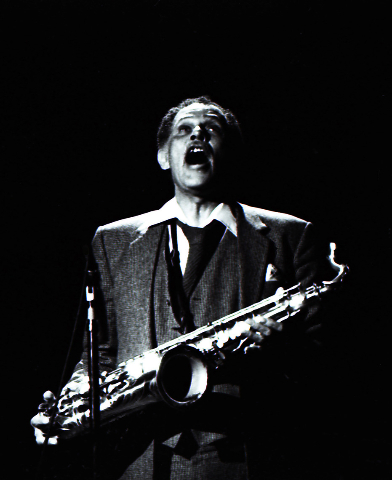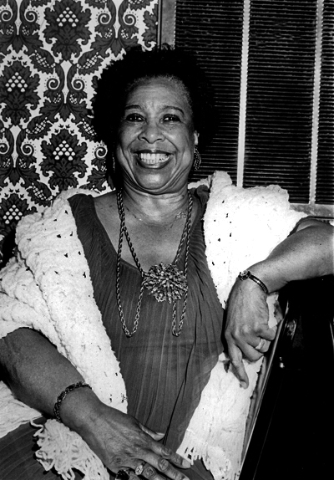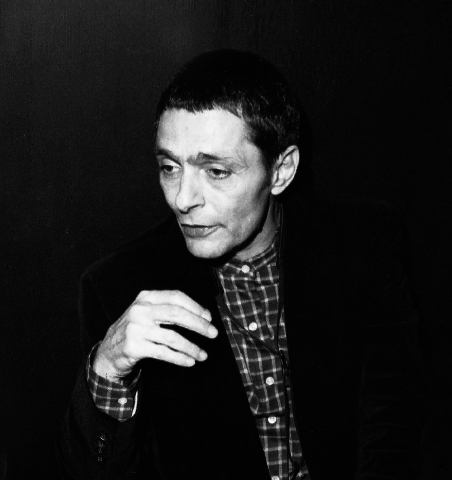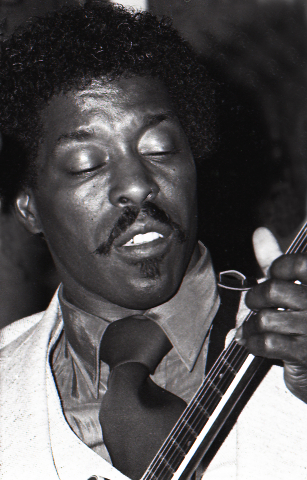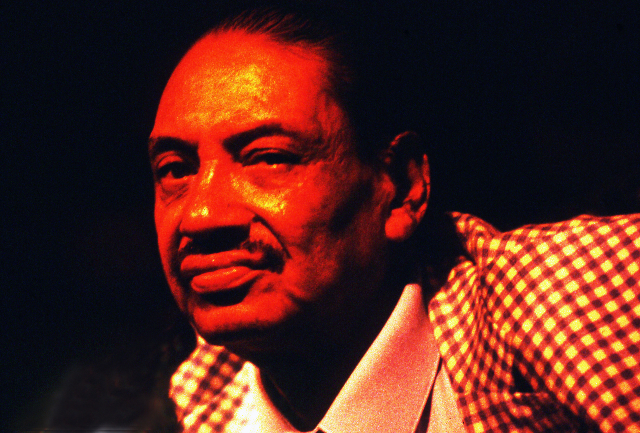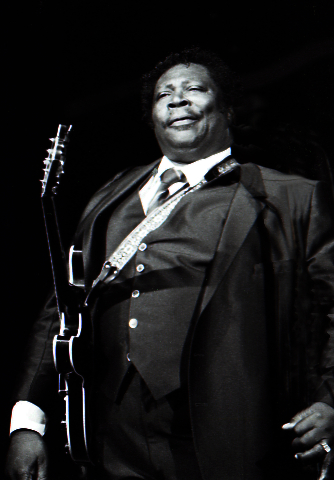Hipster Filmmaker Henry Ferrini
From Jazz to Gloucester Writers' Center
By: Charles Giuliano - Feb 01, 2017
Just before Labor Day, Astrid Hiemer and I were residents for a week at the Gloucester Writers Center. We enjoyed being in the former frame shop and studio of poet Vincent Ferrini where we were surrounded by books.
As a part of the residence I gave a reading which launched my third book of poetry Ultra Cosmic Gonzology.
While the room was being set up for the event I spoke with the filmmaker Henry Ferrini about our mutual love of jazz and the writers of Gloucester who were inspired by the poet Charles Olson.
Now in its seventh season Ferrini was a part of the group that purchased the studio from the poet's estate and established the Center. Recently, they acquired the Maud/ Olson library which is housed in a nearby building. It has facsimiles and reproduced marginalia of Olson's library.
The intensive week focused on research for my fourth book Gloucester Poems: Nugents of Rockport which is nearing completion.
It was a balmy, late summer day when I spoke with Henry in the small, fenced-in yard adjacent to the Center. While it was our first sit down we had long known of each other. It seemed like old times as we spoke about jazz and a mutual interest in the Beverly club Sandy's Jazz Revival.
Charles Giuliano Today when we talked on the phone you said it was Charlie Parker's birthday.
Henry Ferrini August 29. Lester Young's birthday is the 27th of August. Bird's is the 29th. So every year on KCR, Columbia radio, there's a huge festival of music by Prez and Bird.
CG Black lives matter.
HF What an abomination. How many years after the Civil Rights movement we're saying that? That's pathetic.
CG For whatever reason we have devoted a chunk of our lives to...
HF Black culture. It has informed so much of America that most people don't even know about. My father listened to Miles Davis. He listened to Duke, Pops (Louis Armstrong) and opera as well. He listened to Basie, Fletcher Henderson and all of these amazing African American artists. I heard Louis Armstrong in Erie, Pennsylvanian when I was four or five years old.
CG How old are you now?
HF 63.
CG My first live jazz was Duke Ellington at George Wein's club Storyville in Boston. I was a teenager and my Uncle Brother, who loved the Duke, took us. The club was painted black, brown and beige. I remember an integrated audience. That faded later when mostly white people listened to jazz.
HF That may be true for Boston but not for NY and Philly. Boston was so horribly segregated. (As we learned during the bussing and school desegregation ordered by Judge Garrity.) If you were at the Vanguard that wasn't true.
I grew up in Boston and moved to Gloucester when I was 22.
CG Where were you hearing jazz in Gloucester.
HF (outburst) At Sandy's! Where else?
(Sanford Berman ran a club in Beverly, Sandy's, which over the years changed format from disco, to rock/blues/folk, and finally was reconfigured as Sandy's Jazz Revival. For a period of time I worked there as publicist, MC and bartender. This followed a stint as jazz/ rock critic for the Boston Herald Traveler.)
Sandy's baby. Come on. That was a world famous jazz club. It was here on the North Shore. And the MF'rs tore it down to put up two stinking condos. Scanlan, the dude who was Mayor of Beverly, totally destroyed a world class jazz club in Beverly, Massachusetts. He's going to rot in jazz hell for that.
Sandy was his own worst enemy.
CG I have my Sandy's stories.
HF I bet. When Sandy died he willed the club to a few people and I was a part of that cabal. The other guy, who shall remain nameless, screwed up and the city did not accept the site's non profit status. They started charging us back taxes. There was a caveat that it had to revert back to the family and we lost the building. It was sold to a developer and torn down.
There are ugly boxes on the place where Dexter Gordon first came back to America. Where Art Pepper played all the time. Where Satchmo celebrated his 60th birthday.
CG I was there for Dexter's gig at Sandy's. I had lunch with him in Copenhagen and wrote a Sunday piece for the Herald. He was drinking schnapps and I was trying to keep up with him. At Sandy's I said "Hey Dexter, remember me? I met you in Copenhagen." He said "No baby." That became a running gag. Every time I hung with him I would ask "Hey Dexter, remember me?" The answer was always "No baby." What a giant.
I understand that you play sax. Were you in bands? Did you gig?
HF Not really. I studied music for a long time. In college I never really played.
CG You praise Sandy which I have trouble with having known and worked with him. My hero was Lennie Sogaloff of Lennie's on the Turnpike. He was a true hipster. Or Freddy Taylor of the Jazz Workshop. Compared to them Sandy was a wannabe.
HF Sandy copped a lot of his shit from Lennie. (Lennie died at 90 on July 14, 2014. His house band was Buddy Rich. A local comic, Jay Leno, started with him.)
I interviewed him a couple of years ago. He was old but doing great.
At the same time I started two non profit organizations. I co-founded this place (Gloucester Writer's Center) with a dear friend Annie Thomas and a couple of other people. That was in 2010. In 2009 I started the North Shore Jazz Project.
There's a club in Beverly, Chianti's, which carries on some of the Sandy's tradition. It's run by Rich Marino. About five years ago we brought Lennie over (from Marblehead) and had a tribute to him. A lot of players came up for the event.
CG If we're talking about jazz clubs there's the Jazz Workshop. Then the South End club Lulu White's run by Chester English.
HF I never went there.
CG Back in the day there was Connelly's Stardust Room in Roxbury. They had a house band with Al “Bottom’s Up” Tyler and brought in a weekly headliner.
HF I have a t-shirt from there. Wally's in the South End. Sammy Price played in Boston for years. I wish I had known back then that I would be doing this film (on Lester Young) Sammy played with Lester.
CG Before my time after hours the Ellington band played at the Pioneer Club. Johnny Hodges and Harry Carney were from Boston/ Cambridge. So Boston gigs were homecomings for the band. Harry was Duke's driver.
Let's talk about the literary heritage of Cape Ann. I grew up here summer in Annisquam but knew nothing about the writers. As an art historian I know about Gloucester’s artists. But Charles Olson, Henry Ferrini, Gerrit Lansing, Peter Anastas all of that is new to me. T.S. Eliot even plays into this.
HF Peripherally. He was just a kid on Eastern Point. There's his poem "Marina" which has some beautiful Gloucester styling in it. I actually turned it into a ballad which was sung at the Writer's Center events.
CG How did this get started? Was it through your uncle Vincent (Ferrini)?
(Venanzio Ugo "Vincent" Ferrini (June 24, 1913 – December 24, 2007) He was the son of Italian anarchists who worked in the shoe factories of Lowell. Vincent wrote many protests to the Gloucester Daily Times in the form of poems. He published some 30 books. Ferrini was a friend and rival of the poet Charles Olson. “The mightiest empire on earth is useless, stumbling on three crutches/Not even the broken down shadow of a job,” he wrote in his 1988 autobiography, “Hermit of the Clouds.”)
HF Totally. If it wasn't for Vincent I wouldn't be doing this. It's a labor of love. He lived in this place. He bought it in 1948 from his brother who had it. This was his frame shop.
His family had a house on Eastern Point Road where Rudyard Kipling lived. He stayed at the Hawthorne Inn and Vincent's family had a house next door.
CG The Hawthorne Inn burned down. When I was a teenager in the 1950s George Wein had a summer jazz club there.
HF He did. I talked to him about that. He's in my Lester film.
CG Did you inherit this property?
HF No. We purchased it from his estate. Vincent died on Christmas Eve, 2007. When he checked I decided that I wanted to do a living memorial. I tried to mobilize people to help me and it wasn't successful in 2007. I worked on it until the winter of 2010. In three years I was able to raise eight grand. Then I said, screw it, I'm sick of raising money and I'm not going to do this. I'll take the money and digitize some of Vincent's books. Put it on the internet and that will be it. I got bogged down and a couple of months rolled by. It was April. I got a call from a mutual friend, Paul Sawyer, a Unitarian minister and an interesting cat.
CG Who were the heirs?
HF My cousins Shelia and Owen Ferrini. Shelia lives in Boston and Owen lives in Gloucester.
They had it on the market but in 2007, you may recall, there was a big housing bubble. The realtors felt that my cousins could get a couple of hundred thousand for it.
Paul called in late winter or early spring of 2010 and he said "Henry. I have pancreatic cancer and the doctor says I have two or three months to live. There are two things I want to finish before I die. I want to finish and publish a book I have been writing for several years. The other thing is that I want Vincent's place to end up as a writers' center. Will you help me?’
He knew what he was doing and that it was a checkmate move. He knew I couldn't say sorry dude see you later.
That was March. By June the real estate market had tanked. Paul called my cousin Shelia and negotiated the sale of the place. He was her friend and negotiated the price down to $100,000. By June we had raised $82,000. Paul died the day after Vincent's birthday the 25th of June. So we are now in our sixth year.
CG You program year round.
HF We do. In the middle of December we're dark until the middle of January.
We don't just offer people writers-in-residences. That's only one program that we do. In a year we only do nine or ten residencies. They are at the end of the month and start in March. This is our space and when we have writers in residence we can't use it. That creates problems with the rest of our programming.
This place is incredibly active but we have no endowment.
CG Can people apply?
HF It's by invitation because it's so few. But people can get in touch with us. Most of the people who come here have a connection to Gloucester. That's the reason I invited you because of the work you are doing. I am interested in the Nugent story as an outsider.
CG How many documentary films have you done?
HF The first was about the guy who lived here. I did an hour long piece on Vincent. It was shown on regional PBS. It's called "Poem in Action."
CG Did you know anything about filmmaking?
HF No. I'm self taught. I shot it and did everything. I've always been a do-it-yourself guy.
I'm a busy guy. This place takes a huge amount of time. I'm working on the Lester film. I have a fourteen-year-old. I've got as wife. There aren't enough hours in the day. Making this place work is a labor of love. It fills a huge need for the Gloucester community. Otherwise we wouldn't have lasted for six years.
CG This week I have been exploring the library here. I've been reading some of Vincent's poetry. It seems he was pretty radical and hated City Hall.
HF Absolutely.
CG Most of the names he's ranting about are unfamiliar to me. One that I know is Nate Ross, the former Mayor and football coach at Gloucester High. He was a neighbor of ours in Norwood Heights.
How much did the politicians screw up Gloucester?
HF A major problem was during urban renewal. Thank God for Mayor Harold Bell who saved all of the West End which otherwise would have been destroyed. Now the fishing industry is under incredible pressure because of the diminished resources and legislation.
Because of all that Gloucester is becoming another little Newport.
The Dehyde came down.
CG What's that?
HF The Dehydration plant. Unfortunately, as my buddy Richard Emmanuel, says Gloucester chose to put the toilet in the living room. All the gurry was dehydrated to make chicken feed.
CG Gurry?
HF That's a Gloucester word. It refers to all the guts from processing fish. It's the waste. They bake it.
CG What a stink. I remember the smell of Gloucester.
HF I worked there for a week. When I came home I had to strip and leave all my clothes outside. Then I would immediately get in the shower.
CG How did they let those windmills in the city?
HF That's another story. I'm conflicted about it because I'm in favor of clean energy. The other side is that is has irrevocably changed the landscape. They shouldn't have been out there. (Grant Circle) They should have been put them somewhere else. But it's over so we're screwed. You see them from everywhere. I take a piss and look out the window and see them. I go out on my boat and see them. I think we get $400,000 worth of electricity which is nothing. Who was in charge of that? I don't know.
CG Did you know Charles Olson? (1910-1970)
HF No. I didn't know him. He died at 59 on January 10, 1970.
CG How much have you read into Olson?
HF I did a movie about him. So I spent a lot of time learning about him.
CG Did you read Maximus?
HF Yes.
CG Cover to cover.
HF No. They (poems) are not meant to be read that way. I take some here and then go back over there. (Gulls squawking overhead in the small fenced garden)
CG What would you say about Olson?
HF Watch the film. There's so much to say about him. That's why I made the film so people can learn about him. He was a compelling character who spoke to a side of Gloucester.
Ferlinghetti called Vincent the conscience of Gloucester.
Olson's view of Gloucester was that he took this place (polis) and created a world out of it. If you are interested in exploring worlds that's a great place to start. If you live in Gloucester there is a lot to be learned going into those poems. One of his words is the Greek eidenai "to know" and it means to find out for yourself. That was a lesson I learned from him.
This is my place and it was Olson's place. I'm intimate with this place.
CG That's how I feel when I read much of him. Gloucester is in my DNA.
We were in the Maud/ Olson Library and a young woman showed us a copy of Maximus translated into Japanese. That seems so daunting if not impossible. The artist Susan Erony has transcribed it word-for-word as an exhibition piece. The level of dedication and equity that entails is simply staggering.
How did you find Olson footage for the film?
HF The NET (National Educational Television) came and shot him reading so I used that. There is about seventy to eighty minutes. I probably used three or four minutes.
I wish there was an hour of Prez footage.
CG How do you make the life and material accessible and palpable to viewers?
HF I like to start and build out. I enter and explore this place. I explore Olson and learn about him. It's a process which is much greater than a finished film but that's what comes out of this process. You should ask someone who saw the film and what they got out of it. Olson's a daunting character to enter into. The film helps people to enter.
CG Did you consult with people who knew him like Gerrit Lansing?
HF Yes. Gerritt's in the film.
CG How many original sources were left when you were doing the film?
HF Ed Sanders and Donald Byrd knew him. Vincent. Robert Creeley. There were a lot of people around who knew him. I went after all those people and interviewed them.
All my films take a long time. My Kerouac film took seven years.
(Poem in Action (1990) on Vincent Ferrini. Radio Fishtown (1990) From his cramped and lonely studio in Gloucester, Simon Geller ran the only one-man radio station in the country. Narrated by the late Robert J. Lurtsema of WGBH-FM. Middle Street (1994) a Gloucester portrait narrated by Willie Alexander. Witch City (1996) on Salem by Joe Cultrera, Henry Ferrini, John Stanton, Bob Quinn and Phil Lamy. Lowell Blues (2000) on Kerouac. Last Call: Dreams, Main Street and the Search for Community (2002) photographed and edited by Ferrini and directed by John Stanton about a Nantucket barroom. Polis is this (2007) on Charles Olson.)
CG Will Prez be your only jazz film?
(Lester Willis Young (August 27, 1909 – March 15, 1959) was a tenor sax player best known for his role with the Count Basie band. His lyrical, melancholy style was an influence on the transition from big band swing to combo bop. He performed and recorded with the Norman Granz Jazz at the Philharmonic series.)
HF No because I collaborated with Lee Konitz on the Kerouac film. Lee was an aficionado and Kerouac may have written a bit about him. I worked with Willie Alexander on that. He worked with me on the sound track and then we brought it to Lee. He improvised over it. That was very cool. It has a nice light, tight feel to it.
I was working on a documentary about Sandy's. I was his heir apparent. When he checked he gave us the club. Unfortunately we had some guys who screwed up.
CG I remember him talking about wanting to turn it into a museum and foundation.
HF He knew that it had to happen before he checked. Otherwise it wasn't going to happen. But he was so disorganized. The plan was for this to happen in the '80s.
I did a film there with Preacher Jack and George Leh. We were going to do a TV show.
CG Sandy was a champion of George Leh. I have mixed feelings but he could also do some very good things. Have you heard the Bukka White story?
HF No.
CG Early on I advised Sandy to book blues acts. They did well and he got interested. Some of the guys I recommended were too old and couldn't travel. We had Buddy Guy and Junior Wells, T-Bone Walker, Mighty Joe Young, Hound Dog Taylor, Koko Taylor.
I was no longer with him when he brought Bukka White (November 12, 1909 – February 26, 1977) to Beverly. He got sick and Sandy took care of him. He died in Beverly.
HR He was probably double booking with that club in Cambridge.
CG Joe's Place, Joe Spadafora. He had a Harvard Square joint and then moved to Inman Square. That's where John Landau first saw Bruce Springsteen and wrote the famous review that launched his career.
HR You had Big Joe Turner.
CG That's right. Sandy got connected with Dick Waterman who managed blues acts. He was the original promoter of Bonnie Raitt when she lived in Cambridge.
He took care of Bukka.
HF No, his mother Rose did. If he didn't have her someone would have shot him. He lived with Rosie and she took care of him. Everybody loved her; Helen Humes and J.C. Higgenbothem. He lived there at Sandy's place. Rosie fed him. I knew Sandy after Rosie checked. That's why he died so young. He was a mama's boy.
I went to her funeral and Sandy said "Henry, I was about to jump in to the hole with her."
CG If only Sandy had been a little more like Rose.
He made money when his place was the only disco on the North Shore. He had a juke box and hired a drummer to augment the beat.
Tell me about the Maud/ Olson library.
HF I did a short film about it for the archives.
CG Talk about the literary scene in Gloucester.
HF I starts with Olson and goes to Ferrini. There's Jonathan Bayliss who wrote fiction about Gloucester. (The first three of his quartet of novels about Gloucester add up to more than 2,300 pages, and he was putting the finishing touches on the fourth when he died in 2009. That page count, however, may substantially exceed the number of readers who have attempted, let alone finished, his books of unconventional fiction.)
CG What will the Library do?
HF It will attract Olson scholars. It already has. We have a signup sheet of people who want to come back and do research there. It increases the stock of Olson around here. I hope that high school kids will come and check out the mind of this guy who read all these books. Its diverse subject matter.
Stories I've heard is that he would read eight hours a day. He would stay up all night reading. His writing is from those books. He had his own life experience but he drew from the books. You should talk with Peter Anastas who has written a lot about Gloucester. He knew Olson.
CG What does Gloucester mean to you?
HF When I decided I didn't want to go to college anymore I came up here with a woman and I started not having to be in school. That was a great relief for me. It's a great community. That idea of polis, Diane di Prima said it nicely in my film "Polis is a human scaled place that is small enough that you can walk around in a day." People know each other to a degree. It has this magnificence. The beauty that's here is remarkable.
CG There are interesting comparisons between Olson and Pound. Both lived on islands, Cape Ann and Venice.
HF Olson visited Pound in the hospital. They developed a friendship but ultimately they were estranged because of Pound's anti Semitism. He last saw him at Spoleto.
CG Why are you doing a film on Lester Young?
HF I play the saxophone. I play tenor but nothing like Lester that's for damn sure.
CG After he was dishonorably discharged from the military you can hear a melancholy in his playing. (He was court marshaled and spent a year in the brig.)
HF That's also just from getting old.
(Severe drinking damaged his liver and weakened him. This diminished his playing. He was in extreme pain on a flight home from Paris and died not long after in New York. When we spoke Ferrini was planning a trip to Paris to film and research that part of the story.)
CG He and Lady Day there is such melancholy in their music. They were lovers.
HF No they weren't. Not in anything I've come across. That's more of a myth. They were great friends. He gave her mother the name The Duchess. They became estranged. She said about it "I hurt his feelings." He was a sensitive guy and easily hurt. That's all she says in her autobiography.
CG How difficult is it doing a documentary of a classic jazz artist?
HF Pretty damned hard. Particularly raising money. There's basically no interest. I'm persistent. I just can't stop. I've got to get it done. I've spent so much time doing it I can't just let it go. You keep going after it and it takes you in different directions. With the NEA thing I hope I can finish it in a couple of years. The NEA gives the project credibility.
CG How do you make a living?
HF I get by. I worked with Steve Nelson (now in the Berkshire but then in Gloucester) and his Nelson Network. I was a cameraman. We called it the Nervous Network. Compared to working with him Sandy was an angel.
I also do freelance work with non profits. I did a short film about the arts in Gloucester. Primarily I work as a director/ producer. Also shooter and editor. As a one-man-band I do OK in making a paycheck.
CG What does a film like Lester cost?
HF Shooting digital you can figure that out. But what do you think the rights to the music costs? If I use 25 minutes of music from Sony take a guess what that costs? Maybe $75,000.
CG That doesn't make sense. You are promoting their artists. People will see the film and be motivated to buy the music. You are doing their work.
HF My plan to get around that, which can't happen until I make the film, is to make an argument for fair use. I want to do some animation on this film. A lot of it is based on audio interviews. That's something I don't do myself.
CG So rights are a huge chunk of the budget.
HF That and animation. Going to all of these cities and shooting, hotels and flying around that's a huge chunk of change. I've been doing it all on my own dime. I've done interviews with some amazing people. Sonny Rollins, Wayne Shorter, B.B. King, Branford Marsalis, Lee Konitz, George Wein.
CG At what point do you become a resource? Can people buy rights to your material?
HF They could but I'm not interested. My Sandy's stuff is a huge archive. I have interviews with Clark Terry, Big Joe Turner, Larry Coryell, Tiny Grimes. Good interviews with people who are long gone.
I want to get this one done and start on the next one. It's a story I have wanted to do for a long time about my grandfather. About him being an immigrant and coming from Russia.
CG On your mother's side.
HF Yeah. That's a story I want to tell before I check. There's a lot to do before the lid comes down.
Peter Anastas on Gloucester and Olson .

